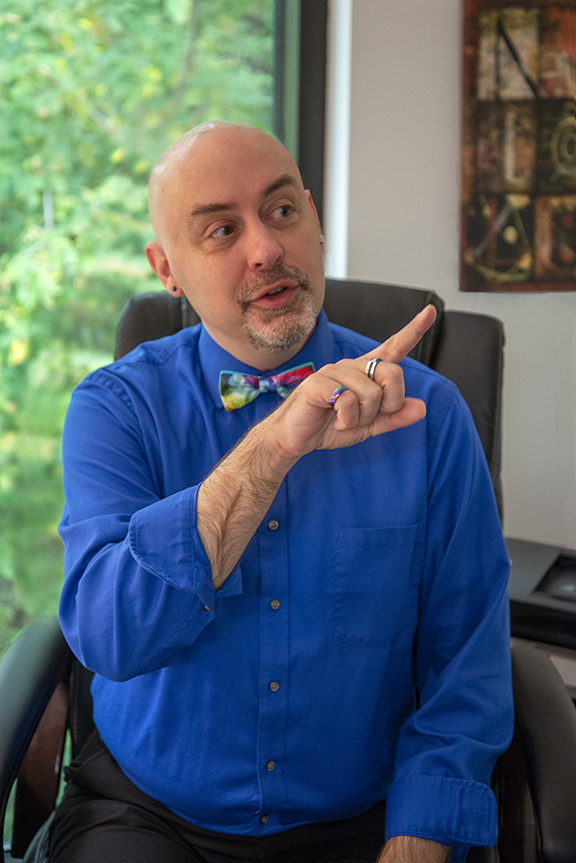Understanding identities
Alumnus counsels clients, teaches students how to do the same across spectrum
by Laurie B. Davis

His personal journey working on behalf of the LGBTQ community began early and served as the impetus for earning four degrees from The University of Toledo. ““I started young; being a gay teenager in the 1990s came with all sorts of trials and tribulations but also started me on my path in advocacy,” says Rose (A/S ’09, BA Psych., BA Phil., Ed/HSHS ’12, SJHS ’16).
Rose became a clinical mental health counselor who specializes in affirmative therapy, a form of psychotherapy that validates and advocates for sexual, affectional, and gender minority individuals. Rose also teaches in the clinical mental health and school counseling programs at Bowling Green State University as an assistant professor.
“I am known as an affirmative therapist and affirmative supervisor,” says Rose. “I teach students and those who need supervision for their licensing that sex and sexuality are not dirty words. People are sexual beings, and we have to talk about that. Gender identity, gender expression and gender roles are things we all run into, and we can’t make assumptions that are incorrect when working with clients,” says Rose.
Rose has lectured and trained others through authoring peer-reviewed journal articles and book chapters, and statewide HIV and STD education curricula; has presented at regional, state, national and international conferences; and has participated in numerous educational television and radio broadcasts. He was the keynote speaker at The University of Toledo’s first LGBTQA+ conference last year.
Intersections
Rose also has ties to working with victims of human trafficking. “I was in public health for almost a decade,” says Rose. “I was working with folks who were HIV-positive, and some of them had also been trafficked. At the time, I knew there was a problem, and I knew it was intersecting with the work I was doing. LGBTQ have ridiculously high rates of being trafficked,” he says.

Rose, who did pro bono work at the University of Toledo Medical Center, counseling HIV-positive men for about eight years, modestly views his service and achievements. “I just am doing what I do, and along the way, I manage to accomplish a couple of things. I’m able to do so much largely because it doesn’t feel like work most of the time,” he adds.
Rocket proud
Rose first attended UToledo in 1993, right out of high school. “I came out and was initially disowned by my entire family, although some came around,” he says. Coping with the stress of that process and realizing he couldn’t afford to remain in school, he dropped out. He spent 10 years volunteering in public health before returning to UToledo. “I was never going to teach if I didn’t go back,” he says. “I came back in ’06, and the goal was, I’m not going to stop until I get my Ph.D.”

Even though Rose now works at BGSU, he is a Rocket forever. “I have Rocket blood. All of my degrees are hanging on my BGSU office wall. That rivalry is not my problem,” he says. “When someone says, ‘Oh, all of your degrees come from one place, that’s not very diverse.’ I tell people this all the time: ‘When you’re studying with the best, why leave?’”

Recharge required
Rose also has learned the need to pull away to recharge and rejuvenate. “I have an amazingly supportive husband of 25 years; he makes me laugh,” says Rose. “And I’m a fur dad,” referring to his miniature Schnauzers that entertain him.
He says TV also has become a guilty pleasure. “When I was doing my master’s and my doctorate, I missed a lot of TV, and everyone was talking about all these shows. Now I’m getting caught up. Netflix and Hulu are my life,” says Rose, half joking.
“As counseling educators, we’re carrying a lot with us because we’re training other folks to help people. It’s OK to need some escapist activity.”
He says he’s drawn boundary lines over the past five to six years to not take on too much, and he doesn’t make himself available to clients 24/7. “You can’t serve from an empty vessel. If you’re depleted you can’t give to anybody else. That’s not a good place to be,” says Rose.






